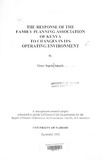| dc.description.abstract | The environment is important to any organization. Organizations must maintain a strategic fit
with the environment if they are to survive, succeed and grow. They also have to respond to its
dynamism, heterogeneity, instability and uncertainty. The environment is a resource and a system
that if well understood and managed, can result to a sustainable competitive advantage and
superior performance to any organization.
The Family Planning Association of Kenya (FPAK) is a pioneer non-government organization
(NGO) in the field of population and family planning. It has been a leader in this field for a long
time. This study focuses on major external environmental changes that have occurred and have
affected FPAK and identifies how the organization has responded to these changes.
A case study on FPAK was used to provide an in-depth understanding of effect of environmental
changes on the operation of organizations, particularly non-government, not-for-profit groups.
The study analyses the environmental changes that have occurred, how these changes have
affected FPAK and how FPAK has responded to these changes.
Personal interviews were conducted with the key management of FPAK who were
knowledgeable on its programme activities. The research results found four major areas of
change: decline in donor funding, the paradigm shift from vertical family planning to integrated
sexual reproductive health, competition, and the poor economic performance of Kenya. The
organization responded to the decline in donor funding by developing sustainability strategies
through cost-saving measures that resulted from construction of own clinic facilities as well as its
own head office. It diversified its services and products and introduced cost-recovery by charging
fees for its services. The programme was restructured to match the changes and to achieve cost effectiveness.
Pressure from competition forced FPAK to change its culture to embrace business like approach
in undertaking its business, and encouraged entrepreneurship, creativity, innovation and
flexibility. Decentralization of decision making to its strategic operational units enabled it to
compete effectively at the market place. FPAK recognized that many of its clients including the
youth have less capacity to pay for its services that now attract a fee. Provision to waive fees for
those unable to pay was introduced. Diversification of services and products was done. The new
services and products can generate more income. This income can then be used to subsidize the
free services.
FPAK responded to the industry sector shift from vertical family planning to integrated sexual
reproductive health by refusing to rest on the laurels of its past success by making a paradigm
shift of its programme from vertical family planning to integrated sexual reproductive health with
a focus on youth. This radical shift involved the development of a new vision, mission and
strategy that would position FPAK once again as a leader in youth reproductive health
information, services and advocacy. Not much has been achieved since the development of this
new strategy in 2000. The organization is in the process of developing sets of goals and
functional policies to define its position in the market place. Reduced funding is a constraint in
implementing this new strategy.
In conclusion, effective response to environmental changes assures survival to many
organizations. The dynamism, instability and uncertainty of the environment requires rapid
responses if an organization is to achieve or maintain its competitive edge. | en |

